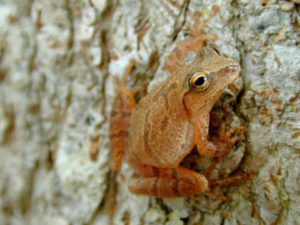When I was young, growing up on the west edge of Manitowoc, I always looked forward to this time of year and the sounds that came with it. I remember meadowlarks singing in the field next to our house along with dozens of other birds each morning as I walked to the bus stop. At night spring peepers and other frogs sang from little ponds in the old gravel pit nearby, and I would open my window so they could sing me to sleep. Several decades later I’ve been fortunate to be able to return to the family place, no longer a farm, and settle back into the area. But there have been some disturbing changes. No meadowlarks inhabit the fields, and no frogs at all sing from the now filled-in ponds. There are still other birds, and other wildlife, but the lack of frogs is disappointing.
 Wildlife is sensitive to what we humans do to the land. Frogs are especially sensitive to chemicals in their environment- both those applied by people and those emitted by invasive plants like common buckthorn. In the area around our place, buckthorn, Eurasian honeysuckle, and autumn olive have all taken over much of the landscape, and areas which were once fields now sport dozens of houses surrounded by lawns. It appears that we are choosing an artificial landscape over our native species.
Wildlife is sensitive to what we humans do to the land. Frogs are especially sensitive to chemicals in their environment- both those applied by people and those emitted by invasive plants like common buckthorn. In the area around our place, buckthorn, Eurasian honeysuckle, and autumn olive have all taken over much of the landscape, and areas which were once fields now sport dozens of houses surrounded by lawns. It appears that we are choosing an artificial landscape over our native species.We use a lot of chemical substances to manage not only crops but urban grassscapes. Like with many things in life, we need to be careful in doing so. In the U.S., about 2.5 kilograms of pesticides are applied per acre for agriculture, over 1.1 billion pounds annually altogether. While this helps feed us, these substances also affect wildlife such as amphibians, fish, pollinating insects- all animals that are not the target of the applications. Beneficial plants are also impacted. It is appropriate to ask if there are measurable effects on wildlife, are there also effects on people? And, if combined with inadequate efforts to keep applied pesticides from being carried to surface or groundwater, the effects are so much the worse. For lawn management, pesticides are applied at a rate 10 times higher than for agriculture. Urban areas also experience runoff issues.
I think David Attenborough, the British naturalist, said it best- that the solution to many of our problems is to not waste. In this case, I think it means being thoughtful about whether or not we really need to control weeds and insects around our homes, and if we do must we apply pesticides heavily? Perhaps it is better for wildlife and ourselves to be very careful when using them and to consider them when nothing else will work. The US EPA has guidelines referring to what’s called integrated pest management and talks about safe lawn care in general at:
Putting a little more thought into how we interact with the world around us is never a bad thing. I hope that someday I will hear frogs singing in my neighborhood again.
photo- spring peeper, one of the smallest and loudest frogs in Wisconsin, from USGS
